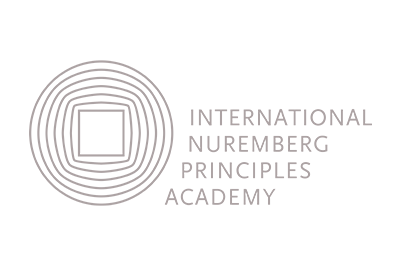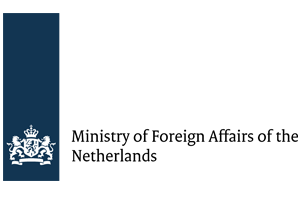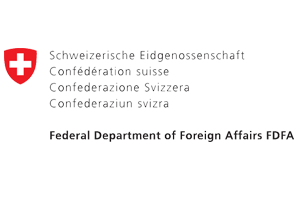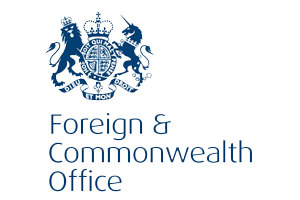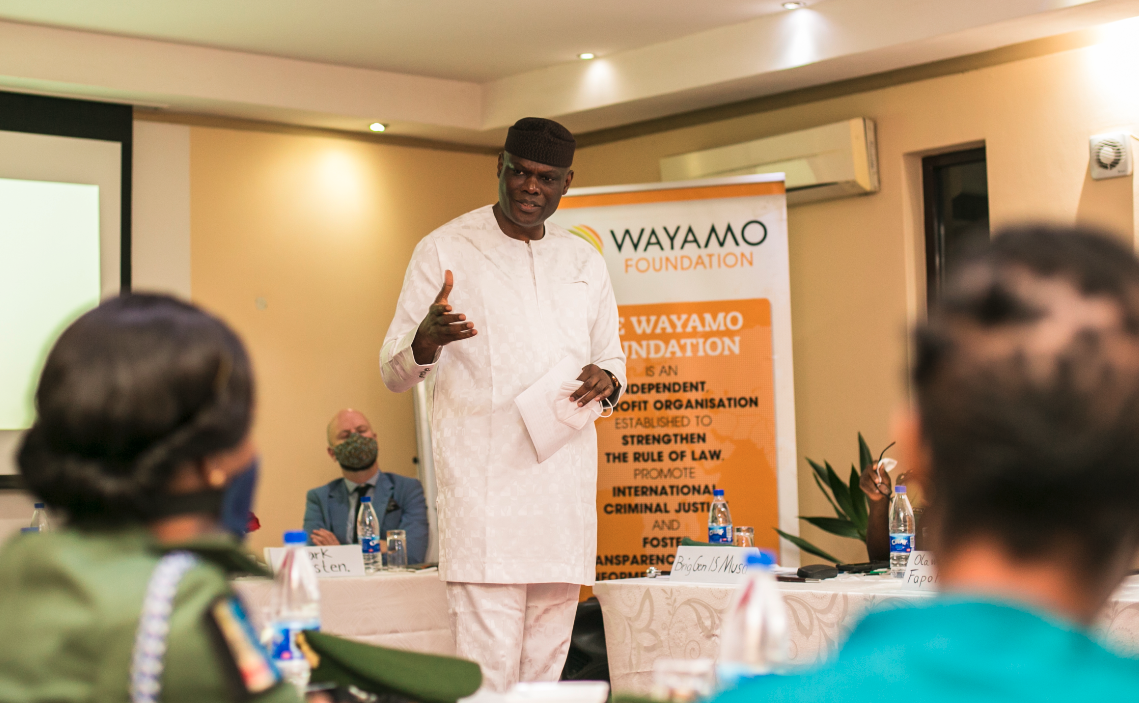
STRENGTHENING JUSTICE AND ACCOUNTABILITY IN NIGERIA THROUGH CAPACITY BUILDING FOR CIVIL AND MILITARY PROSECUTORS IN THE INVESTIGATION AND PROSECUTION OF INTERNATIONAL AND TRANSNATIONAL CRIMES
Nigeria has been suffering from violent conflict between Boko Haram and the government forces for many years. In 2010, the International Criminal Court (ICC) commenced a preliminary examination into the situation in Nigeria, looking at allegations of crimes against humanity and war crimes committed by both Boko Haram and the Nigerian security forces. Its preliminary examination focuses on the existence and genuineness of Nigerian national proceedings relating to these crimes. This is in line with the principle of complementarity, whereby the Court will only investigate serious crimes or prosecute an individual where the state concerned is unwilling or unable to do so itself.
This current project (2016 – 2022) aims to strengthen justice and accountability in Nigeria, and enhance domestic capacity to investigate and prosecute core international crimes and transnational organised crimes. The training seeks to enable Nigerian prosecutors to carry out the prosecution of complex international crimes in a genuine manner. If Nigeria can investigate and/or prosecute the crimes allegedly committed by Boko Haram and the Nigerian security forces domestically, it will be acting in accordance with its international obligations under the Rome Statute and potentially obviate the need for ICC intervention. Domestic authorities are often best placed to prosecute nationals and deliver accountability at home, where the victims and survivors of atrocities can see justice done.
To hold a series of capacity- building training sessions for Nigerian civil and military prosecutors, to equip them to address the most serious and complex crimes under Nigerian criminal law (international, transnational and terrorism-related crimes) including crimes that may potentially fall under the jurisdiction of the ICC.
ACTIVITIES 2016-2022
- 7-9 December 2016, Abuja: 1st Capacity building workshop (for civil prosecutors).
- 13-15 March 2017, Lagos: 2nd Capacity building workshop (for civil prosecutors).
- 28-30 June 2017, Lagos: 3rd Capacity building workshop (for military prosecutors).
- 2-4 November 2017, Abuja: 4th Capacity building workshop (for civil and military investigators and prosecutors).
- 21-23 May 2018, Abuja: 5th Capacity building workshop (for civil and military investigators and prosecutors)
- 1-3 November 2018, Lagos: 6th Capacity building workshop (for civil and military prosecutors and investigators)
- 24-26 June 2019, Abuja: 7th Capacity building workshop (for civil and military investigators and prosecutors)
- 26-29 November 2019, Abeokuta: International Criminal Law Course with a Train-the-Trainer component
- April – May 2020: Online course on Justice for Child Soldiers for civil and military investigators and prosecutors
- July 2020: Online International Criminal Law Course with a Train-the-Trainer component
- 28 October 2020, Abuja: International Criminal Law Course with a Train-the-Trainer component
- 30 October 2020, Abuja: Media engagement
- 2 November 2020, Abuja: High-level meeting to discuss inter-agency collaboration
- 4 February 2021, Abuja: Joint international criminal law (ICL) and international humanitarian law (IHL)
- 5 February 2021, Abuja: Creation of an electronic case-file database within the Complex Casework Group (CCG)
- 9 February 2021, Abuja: Media engagement
- 17 May 2021, Abuja: Creation of an electronic case-file database within the Complex Casework Group
- 21 May 2021, Abuja: Specialist media engagement
- 25 May 2021, Abuja: first capacity-building programme for members of the proposed Serious Crimes Response Team
- 11-13 August 2021, Lagos: second capacity-building programme for members of the proposed Serious Crimes Response Team
- 14-21 September 2021, Abuja: Evidence management training for Nigeria’s Complex Casework Group
- 26 October 2021 – 3 November 2021, Online & Abuja: Case assessment training for Nigeria’s Complex Casework Group
- 29 November 2021 – 3 December 2021, Abuja: Training workshops with civil and military investigators and prosecutors
- 11 March – 29 March 2022, Online & Abuja: Case assessment and redrafting charges training for Nigeria’s Complex Casework Group
PROJECT VIDEO
There is a window of opportunity to address atrocities committed in Nigeria. With our partners on the ground, we at Wayamo are taking advantage of this to deliver meaningful justice.
VIDEO INTERVIEWS
Anietie Ewang is a researcher at the Africa Division of HRW. She describes the challenging security situation in Nigeria and shares her thoughts on how the prosecution of terrorism-related crimes in the country can be improved
Akingbolahan Adeniran talks about issues of international criminal justice, and the challenges, both political and systemic, facing the investigation and prosecution of such crimes in Nigeria.
BENEFICIARIES
Nigerian civil and military investigators and prosecutors.
We asked prosecutors belonging to the Complex Casework Group in the Nigerian Ministry of Justice what they had learnt in our capacity building workshops, what the impact had been, and how it had affected their work.
LOCAL PARTNERS
- Abubakar Malami, Senior Advocate of Nigeria, Attorney-General
- Muhammed Umar, Director of Public Prosecutions for the Federation, Federal Ministry of Justice, Abuja
- Akingbolahan Adeniran, Rule of Law Advisor, Office of the Vice-President of the Federal Republic of Nigeria
- Olawale Fapohunda, Former Attorney-General of Ekiti State and member of the Presidential Investigation Panel to Review Compliance of the Armed Forces with Human Rights Obligations and Rules of Engagement.
TRAINERS
Experts with extensive experience of prosecuting international crimes coming within the jurisdiction of the ICC, other international criminal tribunals and hybrid courts, and/or with in-depth knowledge of Nigerian legislation and military law. These include:
- Ade Omofade, Independent Rule of Law & Human Rights Consultant, with a comprehensive background as an ICC prosecutor, defence lawyer, United Nations Rule of Law Programme manager, Abuja
- Adejoké Babington Ashaye, International Law Specialist, Senior Counsel, World Bank Administrative Tribunal, Washington, and former investigator at the ICC
- Akingbolahan Adeniran, Rule of Law Advisor, Office of the Vice-President of the Federal Republic of Nigeria, State House, Abuja, Nigeria
- Alex Whiting, Professor of Practice, Harvard Law School
- Andrew Cayley CMG QC, Director of Service Prosecutions, Service Prosecuting Authority, Ministry of Defence, UK
- Charles Ayodeji Adeogun-Phillips, former genocide and war crimes prosecutor, international lawyer, and founder of Charles Anthony (Lawyers) LLP
- Charles Garraway, Fellow Human Rights Centre, University of Essex, Retired Colonel, United Kingdom Army Legal Services
- Chino Obiagwu, Chairman of the Nigeria Coalition for the International Criminal Court, National Co-ordinator of Legal Defence & Assistance Project, and Chair of Human Rights Agenda Network
- Claus Molitor, Situation Analyst, Office of the Prosecutor, ICC
- Dapo Akande, Professor of Public International Law, University of Oxford, member of the Africa Group for Justice and Accountability
- Emilie Hunter, Deputy Director, Case Matrix Network, Centre for International Law Research and Policy, Lisbon
- Femi Falana, Human rights activist and lawyer, member of the Africa Group for Justice and Accountability
- Fergal Gaynor, Team Leader and Senior Counsel, Commission for International Justice and Accountability
- Justice Ishaq, Bello Chief Judge of the High Court of the Federal Capital Territory, Abuja
- Rodney Dixon QC, Barrister, Temple Garden Chambers, London
- Kris Kotarski, Digital Programs Manager, Wayamo Foundation
- Rebeka Juhosová, Legal researcher and data-management expert
CONTRIBUTION BY THE OFFICE OF THE PROSECUTOR OF THE ICC
The “Situation Analysis Section”, responsible for preliminary examinations at the Office of the Prosecutor of the ICC, is contributing to the training events by sending a representative to the various workshops to provide an overview of the potential cases which have been identified for the purpose of admissibility assessment.
THE NUREMBERG ACADEMY
This project was implemented in co-operation with the International Nuremberg Principles Academy (Nuremberg Academy). The Nuremberg Academy is devoted to the promotion of international criminal justice and human rights. It is located in Nuremberg, the birthplace of modern international criminal law. Conscious of this historic heritage, the Nuremberg Academy supports the fight against impunity for universally recognised, international core crimes, i.e., genocide, crimes against humanity, war crimes and the crime of aggression. The Nuremberg Academy fosters sustainable peace through justice and the rule of law, by supporting world-wide enforcement of international criminal law, furthering knowledge, and building capacities at the national level to investigate and prosecute such crimes.

